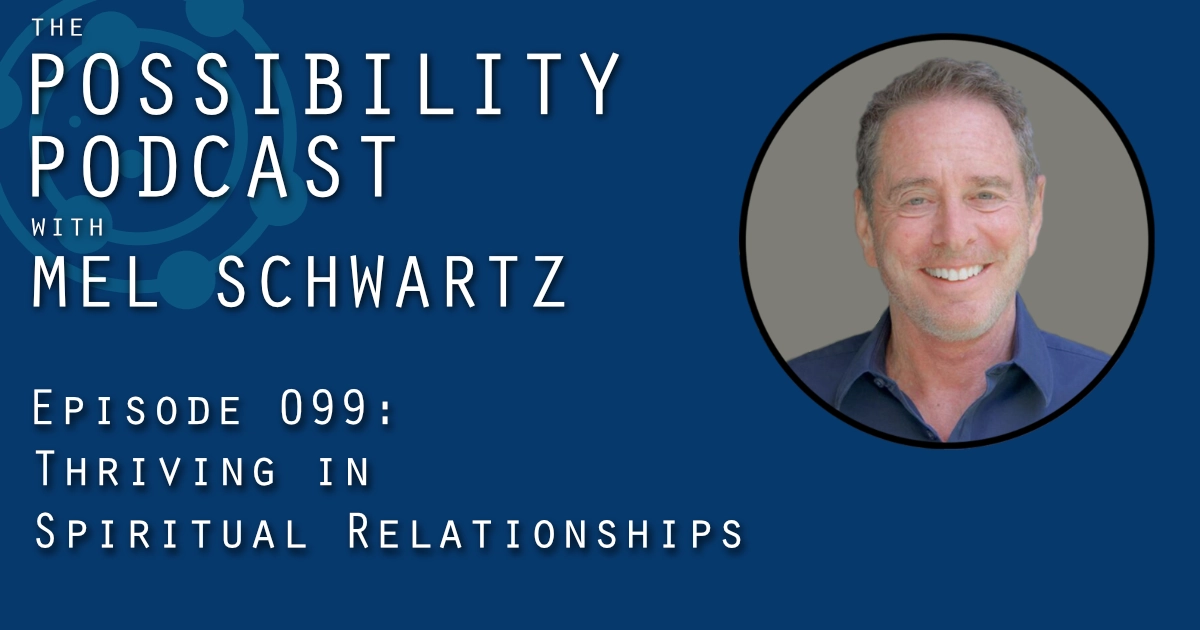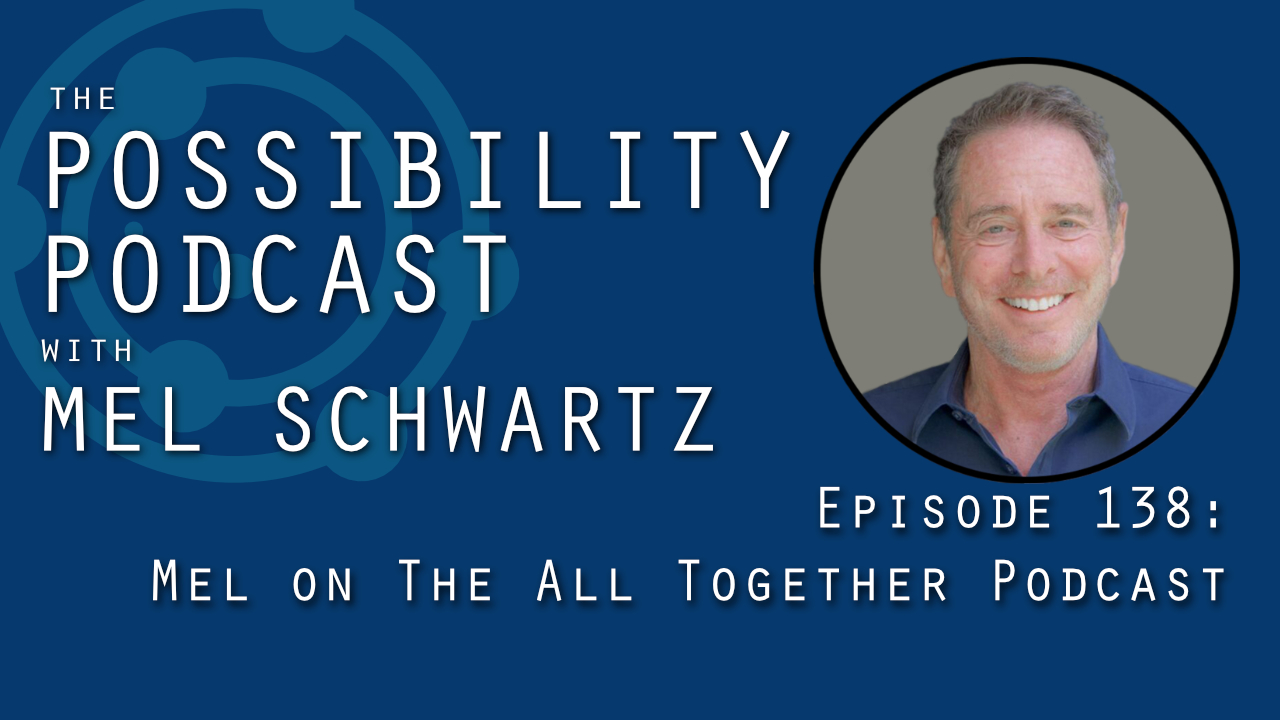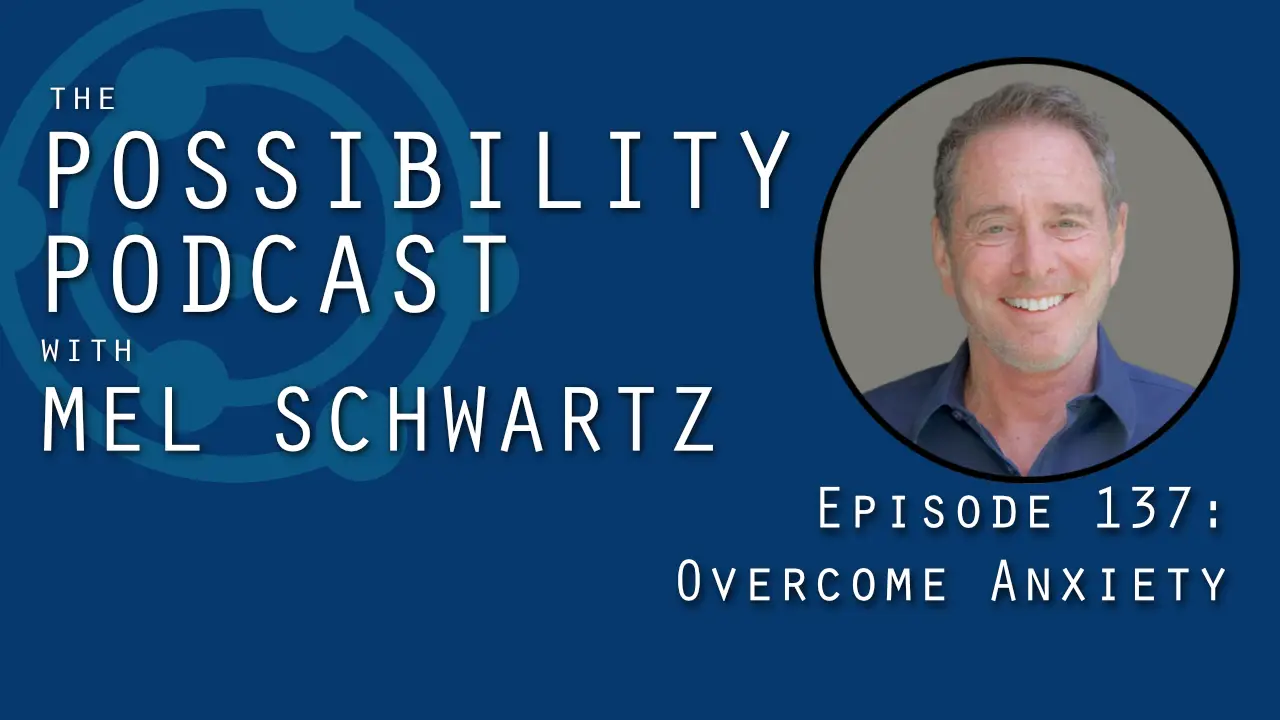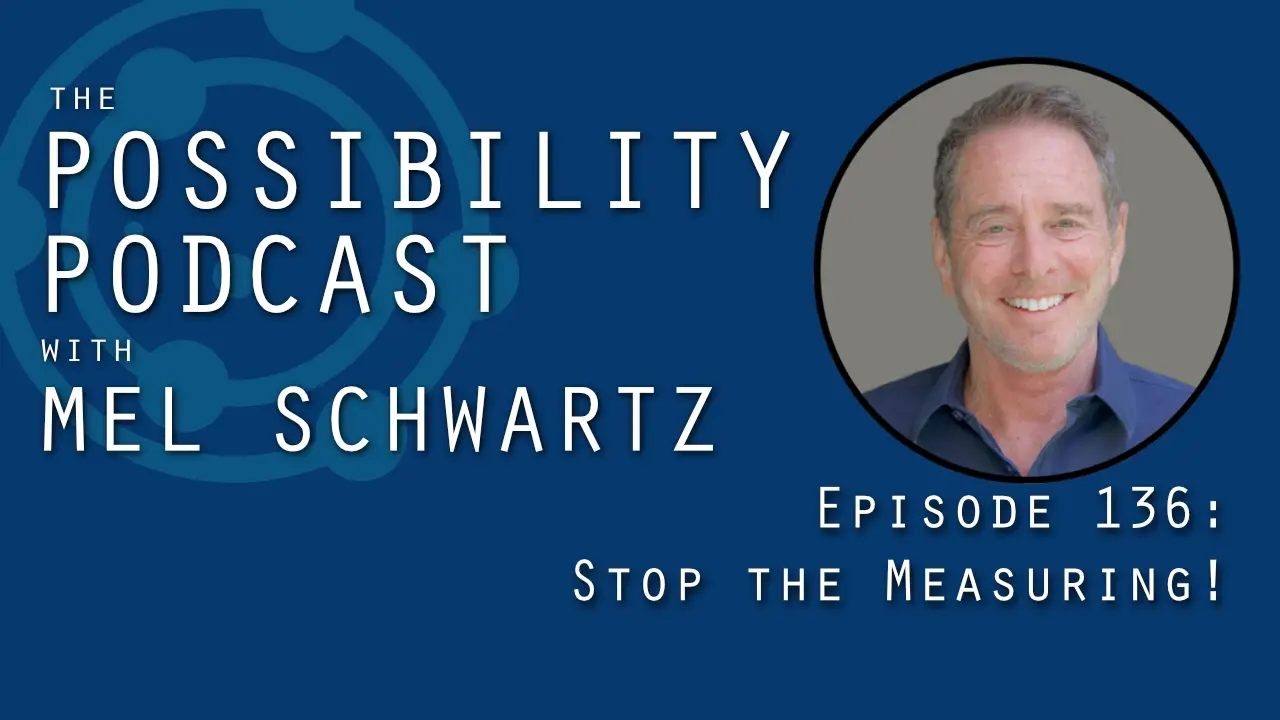Podcast: Play in new window | Download
(Note: This is the corrected, updated edition of episode 099 of The Possibility Principle with Mel Schwartz.)
As The Possibility Podcast with Mel Schwartz gets ever-closer to our 100th episode, I want to express my gratitude to all the listeners… and extend an invitation for everyone to join me in a new, more participatory podcast community experience. Learn all about it in the introduction to this episode, and then be sure to contact me with your thoughts!
Interested in bespoke marriage and relationship counseling from Mel Schwartz? Reach out!
Thank you all for being part of the show!
Speaking of the show: listen to learn how the principles of quantum physics can free us from the static, deterministic worldview of the past and open us — and our relationships — to a vibrant and exciting world of possibility.
And don’t forget! I’d love your feedback on this episode and my future episodes. Be sure to leave a comment!
Subscribe to The Possibility Podcast with Mel Schwartz
Don’t miss a single Possibility Podcast with Mel Schwartz! Subscribe for free in iTunes / Apple Podcasts, YouTube, Spotify, RadioPublic, Spreaker, or wherever you listen to podcasts. Or, simply copy / paste the RSS link directly into the podcast app of your choice!
Please Rate and Review
If you enjoy The Possibility Podcast with Mel Schwartz, please take a moment to rate and review the show in iTunes / Apple Podcasts or Podchaser. It only takes a few minutes, and adding your review is as easy as clicking this link.
Your rating and review helps raise the visibility of The Possibility Podcast with Mel Schwartz, especially on iTunes / Apple Podcasts, which is one of the biggest podcasting platforms today. More visibility for the show means more listeners… and that growth means the show reaches — and helps — more people like you.
Thank you!
Talk With Mel!
Help others when Mel helps you: Contact Mel and find out how you can be a caller on the show and ask Mel a question. He’ll put the Possibility Principle to work for you, and your conversation will be recorded for use in a future episode of the podcast so other listeners can benefit.
Transcript of The Possibility Podcast with Mel Schwartz #099
Hello everyone and welcome to this, the 99th episode of the Possibility Podcast. Wow, when I started, I hadn’t given much thought to where I’d be 99 episodes later. First of all, I’d like to thank all of you, my avid followers and listeners, I think now from 60 different countries. You’ve heard a lot from me over these couple of years. I’d love to hear from you. I’d like to have a more participatory experience. Please send me an email or leave me a voice memo. Tell me what you’d like to hear more on. What topics haven’t I discussed that interest you? What are you hearing too much about? Something you don’t understand that you’d like further explanation about? Don’t be shy, get in touch. If you’d like to come on the show, have a topic you’d like to discuss or something more personal, let me know. And if there are people you think would make great interviews, please make your suggestions. I look forward to hearing from you. Now onto today’s episode.
Hello everybody and welcome to the Possibility Podcast. I’m your host, Mel Schwartz. I practice psychotherapy, marriage counseling, and I am the author of the book, The Possibility Principle, the companion to this podcast. I hope to be your thought provocateur and I’ll be introducing you to new ways of thinking and a new game plan for life.
In today’s episode, I’m going to be looking at relationships, but from a different, perhaps unique perspective. We’re going to look at relationships through the prism of a worldview and how our worldviews impact our relationship.
Now many of you may be familiar with the term worldview. Previously, it was referred to as paradigm, but let me share with you what I mean by a worldview. A worldview is how we think reality operates. Now this is not a constant. Our perceptions of reality change over time. Copernicus, when he saw that the earth was not the center of the universe, radically altered our worldview. And in the 17th century, the thinking of Rene Descartes and Isaac Newton ushered in a brand new worldview in which reality was seen in what came to be known as a mechanistic model. Mechanistic meaning we should view reality as a giant machine or a clock. Descartes called it a clock-like universe and Newton referred to it as a machine-like universe.
Now let’s take a look at the machine. If reality is like a machine, a machine is comprised of separate, discrete parts, each only impacting each other through force and energy, but they’re separate. They’re not connected in any way. Even though quantum physics, which I’ll move into in a moment, in the 1930s radically altered our view of that, we still cling to this, what I’m going to call illusion of separation and disconnected, which leads to an excess of individualism.
Well here’s what I mean. Let’s take a look at the experience of Eros or falling in love. For a period of time, we fall in love and the separation fades. The illusion of separation isn’t there. There’s this wonderful sense of coming together and oneness. That’s what a sense of falling in love is about. We’re no longer separate entities, separate cogs in Newton’s machine. We found meaning and purpose through our connectivity, our sense of oneness.
But as we know all too well in committed relationships, that sense of oneness tends to fade and dissipate over time. We start to compete with each other. We start to move back into our individual sense of self. Excessive individualism comes from the Newtonian worldview of separation. It’s a competitive win-lose, dog-eat-dog world. It’s my needs, it’s my truth versus your needs and your truth. And we fall into this trap.
We don’t have to. Again, the experience of falling in love should teach us that there is a oneness. Let’s turn for a moment to what we learned from quantum physics. In the 1930s, the discoveries of quantum physics astoundingly revealed that, at least in the quantum realm, reality is not only interconnected, but more than that, it’s one. All of reality is one seamless inseparable whole, which includes us. Now, over time, we see that the sense of oneness, inseparability is another way of referring to it, exists not just in the quantum realm, but in our everyday realm. This is consistent with what spiritual teachers have been teaching us. I don’t know how far back to go, but traditions in the East and mystical traditions have always spoken of oneness. Science now seems to be confirming that.
What kind of reality would we experience? What kind of lives would we have if we came at life through oneness rather than competition? Again, extending that experience of falling in love. So it’s not water falling through our fingers as we try to hold on. It’s that retreat to individualism that leads to competition, winning. Now these qualities are absolutely antithetical to harmony.
Think about it this way. Would you rather win? Would you rather compete and win? Or would you rather collaborate and support each other? What does the win really look like? We have to rethink this, guys.
If we employ the quantum reality of oneness into our relationships, then empathy would not be an exception. Empathy would be normative. Because you see, if I care how you feel, because my caring how you feel ultimately, perhaps selfishly, will improve my life. Because if I can improve your life, I am improving my life. We are operating in tandem. We impact each other. But if we bludgeon away and compete with each other, trying to be a winner, that win-lose is a lose-lose. So opening to this new worldview of inseparability allows us to actually be loving.
As you’ve heard me say, it’s easy to say I love you. But it’s far more challenging to act lovingly. Because to act lovingly means even if I don’t agree with you, even if I feel hurt or angry or disappointed with you, to act lovingly, I must care how you feel. So put aside facts and arguments and care how you feel.
So the universe appears to be fundamentally inseparable. Inseparability implies that we are an integral part of everything and everyone. This allows us deep meaning, purpose, and connectedness. Once we start to appreciate that any distinctions we make between ourself and the other person becomes altogether indistinct, inseparability ushers in compassion and empathy. And this becomes the bedrock for healthy relationships.
I’d love to show you my appreciation for your subscribing to and rating this podcast by offering you a gift to one of the following the power of mind, a live talk that I gave or one of my digital ebooks, creating authentic self-esteem, overcoming anxiety or raising resilient children, and lastly, cultivating resilient relationships. Once you have subscribed, please send an email to Mel at MelSchwartz.com and just let me know which gift you’d prefer. Thanks.
When we begin to see our relationships through this new filter of indivisible wholeness and participation, what I mean by participation is get past the objective truth. We are each participating in creating our lived experience together. We are each participating in creating our reality. Then we come to understand that doing harm to the other person is doing harm to yourself. Just like committing violence to another should be as ludicrous as your left arm trying to attack your right arm because it’s separate and in opposition to itself, but they’re both arms are part of the same body. Both of you are part of the same relationship. In this worldview of inseparability, the distinction between yourself and the other starts to melt away. You still are individual souls, but you’re having compassion and empathy as your primary emotions.
Empathy suggests the ability to get into the other’s shoes. Imagine how they feel. The new worldview of inseparability takes this concept of empathy several steps further. If you and the other are part of the same whole, you have much more in common than you might’ve imagined. You see, part of your being is entangled in their being. And this realization allows empathy to flow effortlessly. This type of empathy is precisely the foundation for thriving in relationships. We are dearly missing empathy in our lives in general and in relationships as we rush past each other and our separation-driven self-focus. Empathy gives oxygen to our relationships and sustenance to our lives. It’s the thread that connects us and it’s the source of our being human. Can you imagine how wondrously life could change if our emphasis shifted from me to we? With inseparability, the golden rule is no longer a simply and homily any longer. It’s a logical extension of oneness.
Let me provide you with an example from my therapy practice about how this worldview of separation impacts our relationships. Many years ago, I was working with a couple. I will call him Roberto. I had been working with Roberto for some time, primarily because of significant complaints that his wife and children presented. They found Roberto to be controlling, disconnected, just generally miserable. Roberto lived in the extreme of individualism. His drive, his passion, his reason for being was to assert his needs. You might call him selfish or self-absorbed. And so compassion was beyond his reach. Empathy was a construct that made little sense to him at all. He viewed empathy as self-sacrificing. How could this possibly work out?
In his drive to satisfy his own needs, Roberto became fully disconnected from his family. His priorities were work and achieving greater financial success. Many times he defended himself by saying, it’s a dog-eat-dog world where it’s every man for himself. He and his wife would have what should have been insignificant discussions about what movie to see or where to go for dinner, and it would break down into arguments as he had to assert his choice and to win. How could he connect, collaborate, or love when he was imprisoned by the sense of separation and competition? Remember, the illusion of separation leads to runaway competition. The compulsion to compete, to win at all costs, is pathological. And it’s contrary to relationship success. You can’t try to win and relate at the same time. Let me say that again. You can’t seek to win and to relate at the same time. You must choose. Which are you choosing?
As Roberto had discovered in personal relationships, the need to be right precludes harmony and understanding. This philosophy just drives our lives in an endless race and it destroys our ability to be present and nurture ourselves. You know, something similar happens with this need to compete among high school students, achieving higher and higher levels of academic success, competing but not relating. So I shared with Roberto my belief that his struggle was due to his worldview. Given that Roberto was really stuck in his intellect and he was interested in science, this discussion interested him. I began to share with him this new worldview coming from quantum physics. It wasn’t personal to him, so he didn’t need to defend himself. He eventually opened up to rethinking his attitude about individualism and competition. He was able to turn the corner because he opened to a new worldview.
Imagine yourself connected with your partner, joined together in a mutual destiny, seeking love, compassion and empathy. Rethink your worldview and it will allow you to thrive in your relationship.
Now I’ve just touched the surface here. There’s much more to come and we need to move much more deeply with this. If you want a refresher on this principle of quantum physics of oneness, please refer to my book, The Possibility Principle. Try on this new worldview, come out of competing and come into collaborating and allow empathy to be the guiding light in your life and just see what kind of rewards you may experience from this.
Well, until next time, as always, I wish you well and join with me in embracing oneness.
I hope you enjoyed this episode of The Possibility Podcast. I welcome your feedback on this and any episode. Please send me an email at mel at melschwartz.com or leave a comment in the show notes for this episode at melschwartz.com. If you like what you’re hearing, please take a moment to rate and review the show at Apple podcast, Spotify, or wherever you get your podcasts. Your reviews really help boost the visibility for the show. And it’s a great way for you to show your support. Finally, please make sure to subscribe to The Possibility Podcast wherever you listen to podcasts. And that way you’ll never miss an episode. Thanks again, and please remember to always welcome uncertainty into your life and embrace new possibilities.




